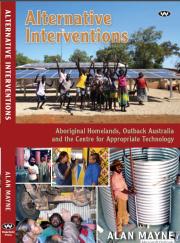28 March 2014
 Put the word intervention together with Indigenous communities and you are likely to get a fairly negative response.
Put the word intervention together with Indigenous communities and you are likely to get a fairly negative response.
Recent notions of intervention have been seen as paternalistic and of limited value in solving intractable problems around poverty, poor health and poor educational outcomes.
But in an important book being launched today at the University of South Australia, Professor Alan Mayne documents the evolution and 30 year history of one of the most successful “interventions” in Australia – the Centre for Appropriate Technology (CAT).
The book will be launched by Alison Anderson MLA, past member of the CAT Board and ATSIC Portfolio Commissioner this evening at the University of South Australia’s City West campus, Hawke Building, level five in the Bradley Forum at 5 pm.
The Aboriginal owned and directed science and technology organisation established in the 1980s with a start-up grant of just $40,000 is today an enterprise with an annual turnover of more than $25 million employing 130 staff and providing technical services to more than 500 remote Aboriginal communities spread across the northern half of Australia.
In his book, Alternative Interventions, Aboriginal Homelands - Outback Australia and the Centre for Appropriate Technology, Prof Mayne documents the roots of appropriate technology interventions from the 1970s in Wales and before that in the writings of Mahatma Gandhi about the community- empowering benefits of decentralised production.
The CAT “bottom- up” model relies on small scale industry developed in communities using technologies appropriate to the environment and the people involved.
CAT offers practical assistance to outback communities for housing, water supply, energy, waste, telecommunications, transport and other infrastructure needs.
“The book tells the history of CAT’s work in small Aboriginal communities to apply appropriate technology rather than dwelling on top-down approaches adopted by government and other mainstream agencies,” Prof Mayne says.
“CAT pushed the boundaries and challenged prevailing public opinion of Aboriginal people – crashing through stereotypes of a “stone-age” culture that stood remote from the modern world.”
The book pays tribute to the inspirational leadership of CAT founder Bruce Walker, and those who followed him in leading the Centre.
Alternative Interventions, Aboriginal Homelands - Outback Australia and the Centre for Appropriate Technology is available through Wakefield Press.
About the author
 Professor Alan Mayne holds a ResearchSA Chair at the University of South Australia, where he is Professor of Social History in the David Unaipon College of Indigenous Education and Research, and the Hawke Research Institute.
Professor Alan Mayne holds a ResearchSA Chair at the University of South Australia, where he is Professor of Social History in the David Unaipon College of Indigenous Education and Research, and the Hawke Research Institute.
He holds a PhD (1980) from the Australian National University and worked until 2005 at the University of Melbourne.
He has also been a Woodrow Wilson Fellow in Washington D.C., a Senior Fulbright scholar at Boston and Berkeley, and a visiting Professorial Fellow at Jawaharlal Nehru University in New Delhi.
His core interests relate to social equity and sustainability.
Media contact: Michèle Nardelli office: 08 8302 0966 mobile: 0418 823 673 email: Michele.nardelli@unisa.edu.au




